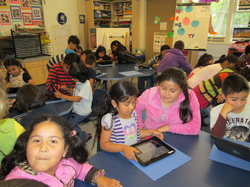By: Martha McCoy
Are 21st Century learning, PBL, and teaching with technology just the newest wheels of school reform to be reinvented only to cycle back into oblivion?
The traditional walls of our classrooms, our schools, and our minds are opening up to new ways of preparing ourselves and our students for a rapidly changing future. In my thinking we are not reforming, we are transforming. We are taking the richness of our experiences, tapping into our passions, and learning how to harness the power of research by learning how to live and teach with an inquiring mind… a mind that looks for answers in every action; a mind that thrives on discovering new problems to be solved and is open to new ways of thinking and acting. A mind that seeks a greater purpose to our actions in the context of or community and our world.
Global citizens have inquiring minds. They are tenacious, gritty, open to change and most importantly, they care and are able to laugh!
Are 21st Century learning, PBL, and teaching with technology just the newest wheels of school reform to be reinvented only to cycle back into oblivion?
The traditional walls of our classrooms, our schools, and our minds are opening up to new ways of preparing ourselves and our students for a rapidly changing future. In my thinking we are not reforming, we are transforming. We are taking the richness of our experiences, tapping into our passions, and learning how to harness the power of research by learning how to live and teach with an inquiring mind… a mind that looks for answers in every action; a mind that thrives on discovering new problems to be solved and is open to new ways of thinking and acting. A mind that seeks a greater purpose to our actions in the context of or community and our world.
Global citizens have inquiring minds. They are tenacious, gritty, open to change and most importantly, they care and are able to laugh!

 RSS Feed
RSS Feed
